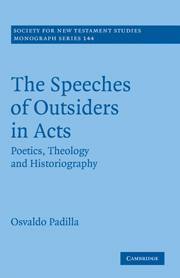Book contents
- Frontmatter
- Contents
- Acknowledgements
- Abbreviations
- 1 Introduction
- 2 The current state of research on the speeches of Acts
- 3 The speeches of outsiders in selected biblical and Second Temple narrative literature
- 4 The Gamaliel speech
- 5 The speech of Gallio
- 6 The speeches of Demetrius and the Ephesian Town Clerk
- 7 The speeches of Claudius Lysias, Tertullus, and Festus
- 8 Conclusions
- Bibliography
- Scripture index
- Index of ancient authors
- General index
7 - The speeches of Claudius Lysias, Tertullus, and Festus
Published online by Cambridge University Press: 22 September 2009
- Frontmatter
- Contents
- Acknowledgements
- Abbreviations
- 1 Introduction
- 2 The current state of research on the speeches of Acts
- 3 The speeches of outsiders in selected biblical and Second Temple narrative literature
- 4 The Gamaliel speech
- 5 The speech of Gallio
- 6 The speeches of Demetrius and the Ephesian Town Clerk
- 7 The speeches of Claudius Lysias, Tertullus, and Festus
- 8 Conclusions
- Bibliography
- Scripture index
- Index of ancient authors
- General index
Summary
This is the final chapter in my exegetical investigation of the speeches of outsiders. In the previous three chapters I demonstrated that the following pattern emerged with respect to Luke's use of the speeches of outsiders: non-Christians, by means of their speech, were the instruments through which the spread of the word was facilitated. In addition, some of the non-Christian speeches served as the voice of the narrator in affirming the legitimacy of the Jesus movement. The outsiders, we observed, were not consciously performing these acts of gospel forwarding and legitimation. Rather, the narrator had introduced sufficient clues in the narrative to allow the reader to conclude that these characters did not realise the wider significance of their statements and actions. In other words, the speech-acts of the outsiders were saturated with dramatic irony. By exploiting this literary technique, Luke was able to accent his own theological/historiographic convictions through the unlikely channel of the speeches of outsiders.
We shall explore in this chapter whether a similar ploy is used by Luke in the speeches of Lysias, Tertullus, and Festus. In this manner I bring to a close my exegetical discussion of the speeches of outsiders in Acts.
Context
The outsider speeches encountered in the previous two chapters occurred in the context of Paul's itinerant mission. Paul and his associates were able to move about freely in the eastern parts of the empire disseminating the message concerning Jesus.
- Type
- Chapter
- Information
- The Speeches of Outsiders in ActsPoetics, Theology and Historiography, pp. 189 - 232Publisher: Cambridge University PressPrint publication year: 2008



